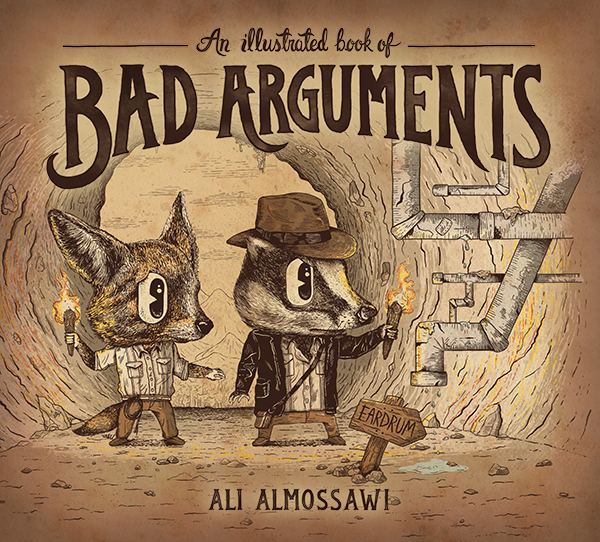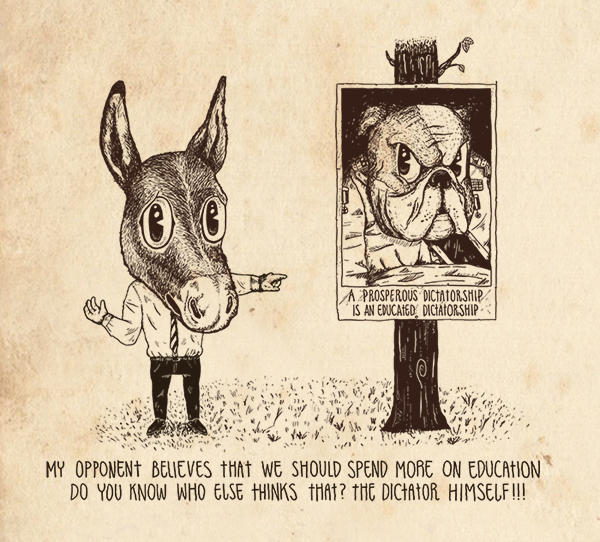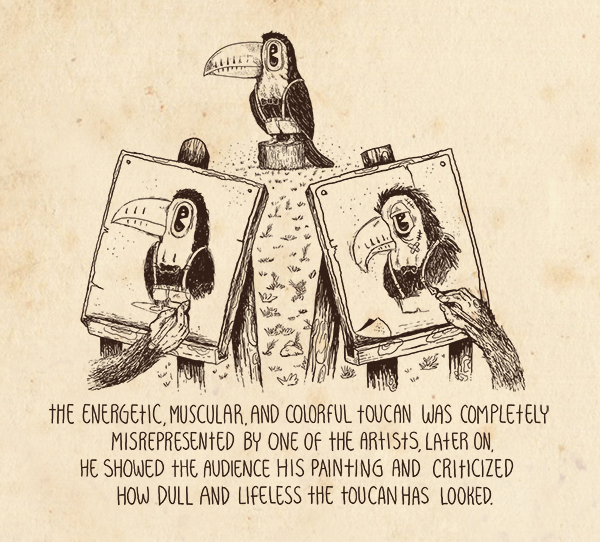Review: 'An Illustrated Book of Bad Arguments'
 It's nice when you can combine two interests at once, such as logical reasoning and the furry fandom. An Illustrated Book of Bad Arguments provides simple explanations of 19 common errors in reasoning and each is accompanied by an anthropomorphic illustration. There are two versions of the book, the online version from 2013 and a print version from 2014. The print version has a new summary page and some different formatting but no added sections. There are probably some minor differences in the text but one should not be worse off if they only read the online version.
It's nice when you can combine two interests at once, such as logical reasoning and the furry fandom. An Illustrated Book of Bad Arguments provides simple explanations of 19 common errors in reasoning and each is accompanied by an anthropomorphic illustration. There are two versions of the book, the online version from 2013 and a print version from 2014. The print version has a new summary page and some different formatting but no added sections. There are probably some minor differences in the text but one should not be worse off if they only read the online version.
With the growth of the internet across the globe facilitating discussion on innumerable topics it has become obvious that many people are incapable of constructive discourse. This has led to internet rules such as "Don't feed the trolls" and Godwin's Law and to mainstream media sometimes removing comment sections altogether. Flayrah has taken the approach of introducing comment ratings and a karma system. It was this general environment that led the author to write himself a guideline on how to argue online and provided inspiration for this book.
Many of the errors presented should be familiar, such as the "argument from consequences" (If x were true, the consequences would be bad, therefore x cannot be true) and the "argument from ignorance" (You can't tell me what caused x so it has to be aliens). Others you might have heard of but not be familiar with or might not know that there is a term for it. For me, "Affirming the consequent" was a term I had heard but would not have been able to explain. It is when a person erroneously takes the consequence of an action to be evidence of that action, which is not always the case. For example the consequence of running a race would be that you become tired. However, it's not true that if you are tired it means that you have run a race.
The Experiment, September 23, 2014, hardcover $14.95, Kindle $9.95 (64 pgs.). Written by Ali Almossawi, illustrated by Alejandro Giraldo.
 While Bad Arguments does provide a nice introduction, its biggest weakness is its brevity. I would've liked to see more discussion about the errors and why they are wrong, when they are not wrong and the reasons we fall for them. I would guess that many of them arise as heuristic approach for solving problems. While it is true that it's a fallacy to reject an idea due to the person who proposes it, due to the sheer number of encounters we may have it is not an unreasonable heuristic approach to disregard ideas from a person whose ideas have consistently been poor or incorrect. There is also the danger of becoming like Fallacy Man.
While Bad Arguments does provide a nice introduction, its biggest weakness is its brevity. I would've liked to see more discussion about the errors and why they are wrong, when they are not wrong and the reasons we fall for them. I would guess that many of them arise as heuristic approach for solving problems. While it is true that it's a fallacy to reject an idea due to the person who proposes it, due to the sheer number of encounters we may have it is not an unreasonable heuristic approach to disregard ideas from a person whose ideas have consistently been poor or incorrect. There is also the danger of becoming like Fallacy Man.
The illustrations, inspired by Animal Farm and Lewis Carroll's stories, are intended to show the errors visually. In some cases this works well but there are some where I needed to first read the explanation then look at the picture again to understand what was going on. I still don't understand the picture for "Composition and Division." That said, the pictures themselves are quite nice although the exaggerated size of the heads will probably turn some away.
 The presence of pictures is an odd addition. While it is great for a paging through and sure to be appreciated by any fur that sees it, it does make the book seem a little juvenile. There is nothing inherently juvenile about illustrations but it is the case that it's an unusual choice for adult non-fiction and might discourage some from picking it up. Alternatively, and this could actually be a positive, it might result in the book being gifted to a much younger audience. If that does happen to be the case then we can only hope that they push through the complex language as more people online who are able to use logical reasoning correctly will benefit us all.
The presence of pictures is an odd addition. While it is great for a paging through and sure to be appreciated by any fur that sees it, it does make the book seem a little juvenile. There is nothing inherently juvenile about illustrations but it is the case that it's an unusual choice for adult non-fiction and might discourage some from picking it up. Alternatively, and this could actually be a positive, it might result in the book being gifted to a much younger audience. If that does happen to be the case then we can only hope that they push through the complex language as more people online who are able to use logical reasoning correctly will benefit us all.
The author is MIT-educated engineer Ali Almossawi who is currently working for Mozilla where he works on data visualization. Some of his work may be of interest to the more technically minded and, obviously, include visualizations from Mozilla such as the adoption of Do Not Track in Firefox and The Web We Want.
All the illustrations are by Colombian artist Alejandro Giraldo whose other works are also available on his website. Not all of his work is furry; he has, for instance, also done promotional work for South African band Die Antwoord. Of particular interest to furs would be his series of artworks titled "Strange Animals" and "Animal Gangs".

About the author
Rakuen Growlithe — read stories — contact (login required)a scientist and Growlithe, interested in science, writing, pokemon and gaming
I'm a South African fur, originally from Cape Town, who spends most of his time in Europe. I'm interested in all sorts of things, particularly science, furry and some naughtier things too!
Comments
A cute idea, but the will probably still go over the heads of those who make, or fall for, these type of argument tropes.
I suppose then the more interesting question is what we should do when we encounter them. Do we risk taking things off-topic by explaining the error, in case they don't realise, or is it best just to ignore them completely and focus on those with whom you can have a proper discussion? Perhaps there's a way to gently nudge them back and hope they realise on their own?
"If all mankind minus one, were of one opinion, and only one person were of the contrary opinion, mankind would be no more justified in silencing that one person, than he, if he had the power, would be justified in silencing mankind."
~John Stuart Mill~
I say do not allow anyone under the age of 15 to comment online, and you solved half the problem.
And this book reminds me of Asking The Right Questions, which was my introduction to the concept (official term as opposed to a general idea) of critical thinking.
Well, I'll be...
Don't think so. It's people of all ages. Just look on the TV. The people there aren't 15 but you'll be able to count off the errors all the time.
"If all mankind minus one, were of one opinion, and only one person were of the contrary opinion, mankind would be no more justified in silencing that one person, than he, if he had the power, would be justified in silencing mankind."
~John Stuart Mill~
It sounds like this book (or the subject matter) should be taught in schools.
I am large grey draft horse. Currently, I am attempting to raise funds due to a death in my family. https://www.gofundme.com/u772rx-rons-funeral-expenses
That would be good!
"If all mankind minus one, were of one opinion, and only one person were of the contrary opinion, mankind would be no more justified in silencing that one person, than he, if he had the power, would be justified in silencing mankind."
~John Stuart Mill~
Post new comment